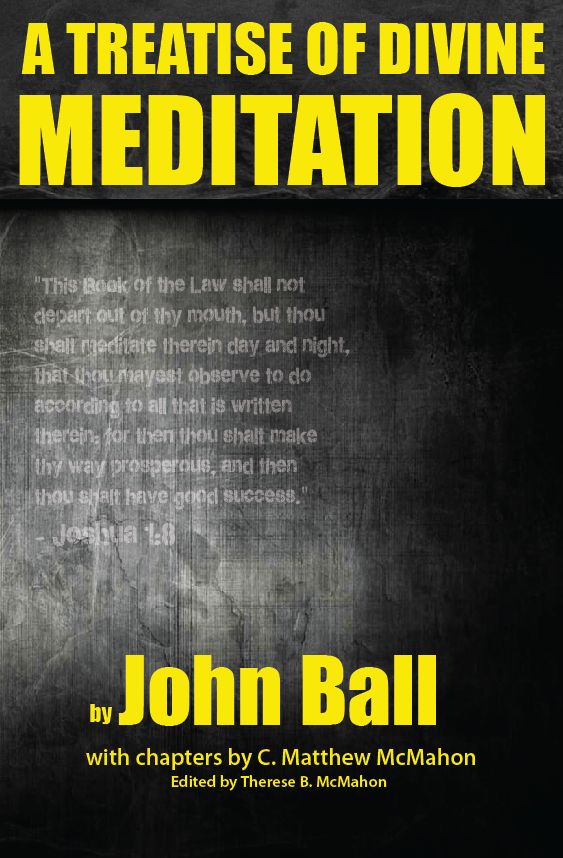John Ball (1585-1640)
A Presbyterian puritan writer who wrote some of the best works on the covenant of grace, meditation and on faith in the English language.“Meditation is a serious, earnest and purposed musing upon some point of Christian instruction.”
His Works:
A Treatise of Divine Meditation by John Ball (1585-1640) – eBook
Buy the printed Book HERE
The works of John Ball:
A Treatise on the Covenant of Grace. (350 pages) HTML Internet Site with a partial text of the work.
Ball’s earliest book was “A Short Chatechisme, containing all the principal Grounds of Religion.” Before 1682 it had passed through fourteen editions, and was translated into Turkish by William Seaman [q.v.] in 1660.
His other works were: “Treatise of Faith” (1632 and 1637), which was very popular in New England; “Friendly Trial of the Grounds of Separation” (1640); “Answer to two Treatises of Mr. John Can,” the leader of the English Brownists at Amsterdam (1642), edited by Simeon Ashe; “Trial of the New Church-way in New England and Old”(1644), written against the New England “independents;” “Treatise of the Covenant of Grace” (1645) (see link above), edited by Simeon Ashe; “Of the Power of Godliness doctrinally and practically handled” (1657); a posthumous folio, edited by Simeon Ashe; and “A Treatise of Divine Meditation” (1660).
Biography of John Ball (1585-1640):
John Ball (1585-1640), puritan divine, was born at Cassington, Oxfordshire, in October 1585. He was educated at Brasenose College, Oxford, where he was entered in 1602, and proceeded B.A. and M.A. at St. Mary”s Hall. Having completed his academic course, he entered the family of Lady Cholmondeley, in Cheshire, as tutor. It was there that he bethought him of “spiritual things,” and was “converted.” He obtained ordination without subscription in 1610. He was then presented to the living of Whitmore, near Newcastle, in Staffordshire. There having been apparently no residence, he was the guest of Edward Mainwaring, Esq. Ball was a nonconformist wherever the relics of popery left in the national church touched his conscience. He was overwhelmed by the evils of the time, and used to associate him- self with near brethren in long fast-days and prayer-days. For keeping Ascension day, he and his little circle were summoned by John Bridgman, the high-church bishop of Chester, who was specially indignant that the “prayers, with fasting,” were kept on that “holy day.” Thenceforward Ball was “deprived” and imprisoned, released and re-confined—alike arbitrarily, finding always a refuge, when at liberty, with Lady Bromley, of Sheriff-Hales, in Shropshire. Calamy tells us that John Harrison, of Ashton-under-Lyne, in Lancashire, was exceedingly harassed by the intolerant proceedings of the bishop, and put to great expenses in the ecclesiastical courts; and when he consulted Mr. Ball what he should do to be delivered from these troubles, Mr. Ball recommended him to reward the bishops well with money, “for it is that,” said he, “which they look for.” Harrison tried the experiment, and afterwards enjoyed quietness (Calami, Account, ii. 396-7).
Ball was an eminent scholar. He was specially learned in the whole literature of the controversy with the church of Rome as represented by Bellarmine. He died on 20 Oct. 1640, aged fifty-five. Fuller says of him: “He lived by faith; was an excellent schoolman and schoolmaster, a powerful preacher, and a profitable writer, and his “Treatise of Faith”, cannot be sufficiently commended.” Wood writes: “He lived and died a nonconformist, in a poor house, a poor habit, with a poor maintenance of about twenty pounds a year, and in an obscure village, teaching school all the week for his further support, yet leaving the character of a learned, pious, and eminently useful man.” Richard Baxter pronounced him as deserving “of as high esteem and honour as the best bishop in England.”
[Brook’s Lives of the Puritans, ii. 440-4; MS. Chronology, ii. 395 (23), iii. a.d. 1640 ; Clark’s Lives, 148-52; Fuller’s Worthies, ii. 339; Wood’s Athenæ (Bliss), ii. 670; Watt’s Bibl. Brit.; Biog. Brit.; Ball’s Works.]




